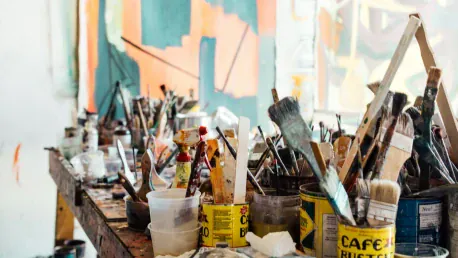In a groundbreaking event for the art world, a Swiss auction house in Zürich sold a watercolor by Russian artist Marianne von Werefkin, authenticated solely by artificial intelligence (AI), for nearly $17,000. This sale, conducted by Germann Auction House, marks the first time a piece of art has been verified exclusively by AI technology, raising excitement and curiosity within the industry. The artwork’s final bid was almost double its high estimate, highlighting the significant impact AI could have in the art market, particularly in the realm of authentication.
The Role of AI in Art Authentication
Fabio Sidler at Germann Auction House lauded the accuracy and effectiveness of the AI technology provided by Art Recognition, a Switzerland-based firm specializing in art verification through advanced algorithms. According to Sidler, the superior authentication methods offered by Art Recognition significantly contributed to the successful sale of the Von Werefkin artwork. This event has potential implications for other art dealers who may begin exploring AI’s capabilities to confirm the provenance and authenticity of artworks, possibly revolutionizing traditional practices.
Art Recognition’s AI operates independently after being trained on a human-curated dataset, utilizing pattern recognition to evaluate an artwork’s authenticity without requiring direct human judgment. Clients can choose between a detailed analysis that provides a probability percentage or a straightforward yes/no confirmation. By offering these two levels of authentication, Art Recognition accommodates different needs, from comprehensive verification to quick assessments. This flexibility could appeal to a diverse range of stakeholders in the art world, from collectors to auction houses.
Hybrid Models and Market Skepticism
Despite the innovative use of AI in this instance, human expertise still played a role in the overall auction process with two additional pieces being authenticated through traditional methods. Louise Bourgeois and Mimmo Paladino’s works, confirmed by human experts, fetched $31,500 and $21,500, respectively. This hybrid model, combining AI and human evaluation, bolstered the credibility of the auction, demonstrating that AI technology doesn’t necessarily replace human judgment but rather complements it, offering a more robust and trustworthy system for verifying art.
Carina Popovici, CEO of Art Recognition, emphasized the importance of collaboration between AI and human connoisseurs, especially in complex cases. Artists with multiple catalog raisonnés, such as Amadeo Modigliani, present unique challenges that AI alone may not yet be equipped to handle comprehensively. Popovici hopes this collaboration will ease the traditional art market into adopting AI, seeing it as a partner in authenticity verification rather than a competitor. This gradual integration could address underlying skepticism and help foster acceptance within conservative sectors of the market.
Broader Market Acceptance and Future Implications
In a landmark event for the art world, a Swiss auction house in Zürich achieved a significant milestone by selling a watercolor painting by Russian artist Marianne von Werefkin. What sets this sale apart is the fact that the artwork was authenticated solely using artificial intelligence (AI), making history at Germann Auction House. The painting fetched nearly $17,000, almost double its high estimate, underscoring the profound impact AI technology could have on the art market, especially in the area of authentication. This marks the first occasion where a piece of art has been verified exclusively by AI, generating substantial excitement and curiosity within the industry. Experts and art enthusiasts are keenly observing how this technological advancement might revolutionize the market, potentially streamlining the authentication process and reducing the risks of forgery. The success of this AI-authenticated sale may pave the way for more widespread adoption of AI in art verification, bringing a blend of traditional artistry and modern technology into the future of art commerce.









